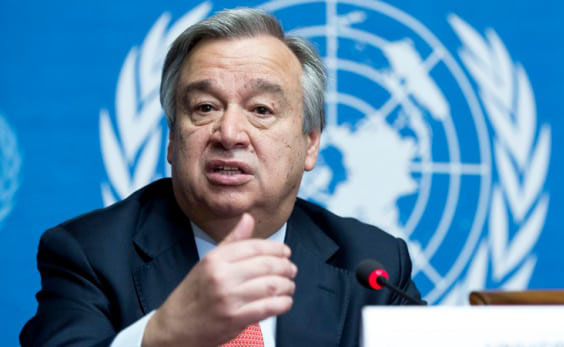Venezuela yesterday criticised the decision by United Nations Secretary General Antonio Guterres to forward the border controversy with Guyana to the International Court of Justice (ICJ) even as President David Granger hopes for acceptance by the Nicholas Maduro-led government.
“We hope that the Venezuelan government has the maturity to accept the decision. Sending the matter to the Secretary General was a course of action mutually agreed on” the President yesterday morning told reporters, following the accreditation of new Cuban Ambassador to Guyana, Narciso Reinaldo Armador Soeorro.
Granger said that he did not expect that “there will be any objection” to the decision since “this has been a long process…it has taken nearly 52 years to reach where we are.”
The President pointed to the many internal problems Venezuela is facing, which has seen persons from that country seeking refuge here , saying too that Guyana has been “victim” of “unwanted “actions such as the presence of Venezuela soldiers in local waters and crimes committed by ‘Sindicatos’ on local miners.
“Venezuela has been undergoing some internal difficulties for the past couple of years we have already been victims of unwanted migration by soldiers… We have been victims of what they call Sindicatos. We hope that this does not trigger any further negative behaviour by Venezuelans,” Granger posited.
But Caracas later issued a communique on its government’s public affairs website, stating its disquiet with the decision. While the press release did not state if the country would accept the Secretary General’s decision, it said that it would defend its territorial integrity.
The release informed that the government received correspondence from the UN Secretary General on Tuesday.
“Through this communication, the Secretary General of the United Nations reports the following: After a brief review of the negotiation process developed during the year 2017, recommends the International Court of Justice as the next means to be used for the solution of the Territorial (controversy) between Venezuela and Guyana by the Essequibo territory. Additionally, he considered that the Government of Venezuela and Guyana could benefit from continuity in the Good Offices of the UN,” the translated release said.
It seems that both countries were simultaneously informed of the decision by United Nations Secretary-General, António Guterres that he recommended that the border controversy be referred to the ICJ as the Ministry of Foreign Affairs here told this newspaper that the President got formal correspondence on Tuesday.
In its statement yesterday, the Maduro government went back to its earlier position that the Geneva Agreement of February 17, 1966 contains the means through which a political settlement of the controversy can be found. Guyana doesn’t subscribe to this notion and has been pressing over the last four years for a juridical settlement.
The Geneva Agreement was established to resolve the disagreement between Venezuela and the United Kingdom.
Guyana’s border with its western neighbour was conclusively settled via the Arbitral Award of 1899. However shortly before Guyana’s independence in 1966, Venezuela began contending that the award was null and void consequently the Geneva Agreement was signed with the aim of amicably resolving the controversy that had arisen as a result of this claim.
The 1966 Geneva Agreement confers on the Secretary-General of the United Nations the power to choose the means of settlement of the controversy from among those that are contemplated in Article 33 of the United Nations Charter. The Geneva Agreement also provides that if the means so chosen does not lead to a solution of the controversy, the Secretary-General is to choose another means of settlement.
Over the last three years, Guyana has been seeking recourse to the ICJ to settle the controversy which emerged in 1962 when Venezuela revived its claim to the Essequibo.
While the press release from Venezuela did not state if the country would accept the Secretary General’s decision, it said that it would defend its territorial integrity.
“In this regard, the Government of the Bolivarian Republic of Venezuela informs the Venezuelan people and the world of the following: Venezuela ratifies the full validity of the Geneva Agreement of February 17, 1966, signed and ratified between our country and the United Kingdom of Great Britain and Northern Ireland, in consultation with the Government of British Guiana, an international treaty that governs as Law the Territorial Controversy between the parties, validly recognized and registered before the UN, the only way to the definitive solution on this opprobrious heritage of the British colonialism. Venezuela duly recorded its strong opposition to the letter of December 15, 2016 (on the possibility of going to the World Court), signed by the former Secretary General Ban Ki-moon, warning that the criteria contained in it exceeded the powers granted to its investiture, contravening the spirit, purpose and reason of the Geneva Agreement and the principle of equity concluded between the parties,” it stated.
“The Government of the Bolivarian Republic of Venezuela, faithful to its historical tradition and in accordance with the Bolivarian Diplomacy of Peace, reiterates its firm disposition to defend the territorial integrity of our Homeland and maintain political negotiation based on the 1966 Geneva Accord, as the only way to reach a peaceful solution, practical and satisfactory for both parties and in favor of our Peoples. The President of the Bolivarian Republic of Venezuela, Nicolás Maduro Moros, guarantees the Venezuelan people that they will continue defending the sovereign rights over Guayana Esequiba and calls for national unity to protect the most sacred interests of the Homeland,” it added.
The Ministry of Foreign Affairs here was asked for reaction to the UN Secretary General’s missive that spoke to Guyana and Venezuela benefitting “from the continued good offices of the United Nations through a complementary process established, on the basis of the powers of the Secretary-General under the Charter of the United Nations” and what it means for this country going ahead.
Through its Public Relations Officer Sharon McPherson, the Ministry replied, “please note that the Ministry of Foreign Affairs is considering the next steps following the decision of the United Nations Secretary-General in choosing the International Court of Justice (ICJ) as “the means that is now to be used for the solution to the controversy” between Guyana and Venezuela.”










